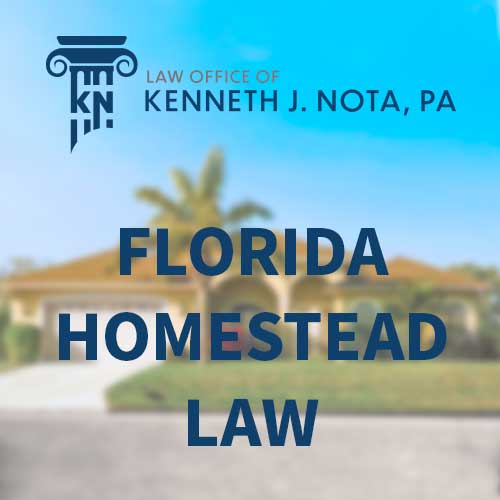When someone moves to Florida and buys a home, they are often advised by the real estate agent or attorney to be sure to file for their homestead exemption so they can get the benefit of reduced real estate taxes. While that is good advice, there is a lot more to the Florida Homestead rules than simply lower real estate taxes. 
Florida’s Homestead rights are embedded in the Florida Constitution and focus on three primary areas: tax exemption benefits, protection from creditors, and restraints on the transfer and devise of homestead property.
The provisions dealing with real estate tax benefits can be found in Article VII, Section 6 of the Florida Constitution, which provides for certain fixed dollar amount exemptions from real estate taxes for property that is the permanent residence of the owner. That section also provides for additional exemptions in some cases for people 65 or older, for certain disabled veterans and first responders, and to surviving spouses of military or first responders killed in the line of duty. Furthermore, Article VII, Section 4 of the Florida Constitution caps the amount by which the assessed value of homestead property can increase on an annual basis to the lesser of 3% or the increase in the consumer price index. It also allows for the transfer of some or all of your accrued homestead tax benefits to a new homestead, should you decide to sell and buy a new homestead. This is often referred to as portability. The specific provision of those two Articles are too long to print here, but can easily be viewed on line from the State of Florida.
Constitutional protection of homesteads from creditors can be found in Article X, Section 4 of the Florida Constitution. It provides that your homestead property is not subject to a lien and foreclosure by most creditors. The three exceptions are (i) for the payment of taxes and assessments, (ii) obligations for the purchase, improvement, or repair of the home, and (iii) for labor performed on the property (like a mechanics lien). However, it is possible that not all of the real estate comprising the permanent residence of the owner, will be protected. Article X Section 4 limits the protection to the extent of 160 acres of contiguous land if located outside a municipality, or ½ acre of contiguous land if located within a municipality. Subsection (b) of this article extends the protection from creditors to the surviving spouse or heirs of the owner upon his or her death.
Article X, Section 4 does however also place some restrictions on homestead owners who are married or have minor children when it comes to transferring the property during their lifetime or devising it in their will. In Subsection (c), the Constitution provides “The homestead shall not be subject to devise if the owner is survived by spouse or minor child, except the homestead may be devised to the owner’s spouse if there be no minor child. The owner of homestead real estate, joined by the spouse if married, may alienate the homestead by mortgage, sale or gift and, if married, may by deed transfer the title to an estate by the entirety with the spouse. If the owner or spouse is incompetent, the method of alienation or encumbrance shall be as provided by law.” Practically, this means that even if the homestead is in the name of one spouse, but not the other, both spouses must agree to a transfer of the homestead while they are both alive. Furthermore, the spouse who’s name the property is in, cannot leave the property to anyone they want in their will. If there is a spouse and minor child, any devise to a third party will be invalid. The spouse will take a life estate and the minor children will receive a remainder interest in the property. This is true, whether the owner acquired the property before or during the marriage.
Constitutional homestead provisions have also been supplemented by statute and interpreted by case law. If you own homestead property, be sure to consult a qualified attorney to help you take maximum advantage of your rights.
